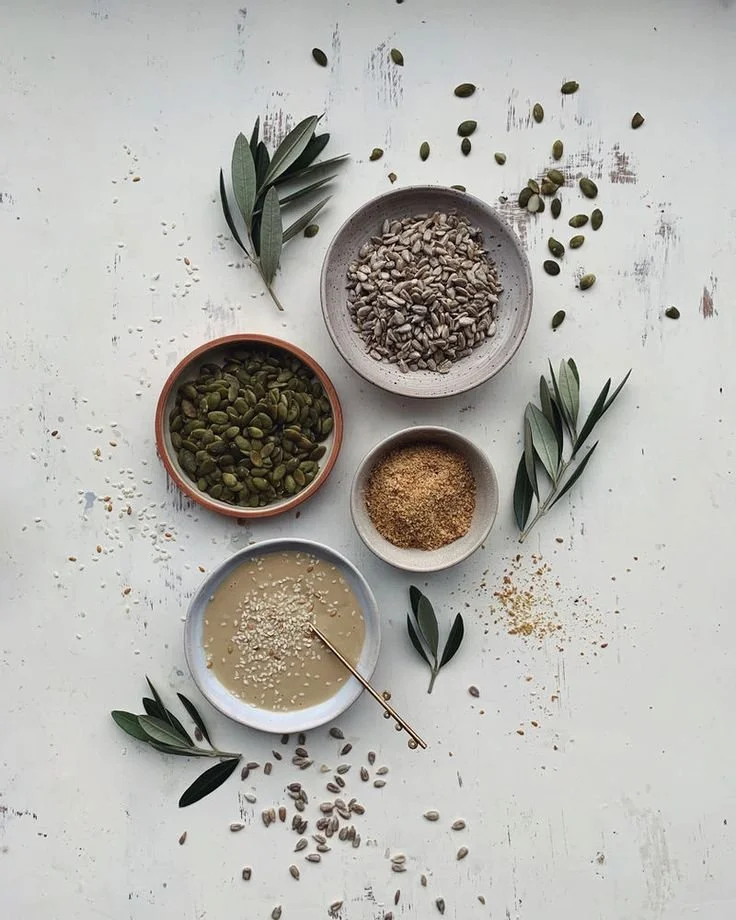Seed Cycling: Does It Really Balance Your Hormones or Just a Trend?
You've scrolled past them countless times - those perfectly curated Instagram posts featuring mason jars filled with colorful seeds, artfully arranged smoothie bowls, and glass containers lined up like little soldiers of wellness. The captions promise everything from "naturally balanced hormones" to "cycle syncing magic."
Welcome to the world of seed cycling, where ancient wisdom meets modern wellness culture. But here's what we're all really wondering: does munching on flaxseeds and pumpkin seeds actually help our hormones, or are we just feeding an expensive smoothie habit?
As someone who's been down the wellness rabbit hole more times than I care to admit, I get why seed cycling feels so appealing. When you're dealing with irregular periods, brutal PMS, or hormonal chaos after coming off the pill, the idea that something as simple as seeds could help feels like a lifeline. But let's dig into what's actually happening here.
The Seed Cycling Promise
The concept is beautifully simple: eat specific seeds during different phases of your menstrual cycle to support your changing hormonal needs. Here's the traditional protocol:
Days 1-14 (Follicular Phase): 1 tablespoon each of flaxseeds and pumpkin seeds daily Days 15-28 (Luteal Phase): 1 tablespoon each of sesame seeds and sunflower seeds daily
Each seed supposedly brings its own hormonal superpowers. Flaxseeds contain lignans that might help balance estrogen. Pumpkin seeds pack zinc for healthy ovulation. Sesame seeds deliver vitamin E for progesterone support. Sunflower seeds offer selenium for thyroid health.
Sounds amazing, right? But before you rush to order every seed variety on the internet, let's talk science.
What the Research Actually Says (Spoiler: It's Complicated)
Here's the thing that wellness influencers don't always mention: there are exactly zero large-scale studies specifically testing seed cycling protocols. None. Zip. Nada.
The closest we get is a small study from the 1990s that looked at flaxseed supplementation in 18 women with already regular cycles. They found some improvement in the progesterone-to-estrogen ratio, but with such a tiny sample size and healthy participants, we can't exactly call this groundbreaking evidence.
However - and this is important - we do have solid research on the individual nutrients found in these seeds and their role in hormonal health. It's just that eating them in a specific rotation hasn't been proven to work any better than eating them regularly.
The Individual Seed Breakdown
Let's look at what each seed actually brings to the table, based on real research:
Flaxseeds: These little brown powerhouses are legitimately impressive. They're packed with lignans - plant compounds that can help your body process estrogen more efficiently. Research published in the Journal of Clinical Endocrinology & Metabolism showed that women eating flaxseed daily had better ovulation patterns and improved progesterone levels. The omega-3 content also helps reduce inflammation, which is crucial for hormone balance.
Pumpkin Seeds: Rich in zinc, which is absolutely essential for healthy ovulation and progesterone production. Studies show that even mild zinc deficiency can mess with your menstrual cycle. Women with PCOS often have lower zinc levels, so adding pumpkin seeds to your diet makes solid nutritional sense.
Sesame Seeds: These contain vitamin E, and here's where it gets interesting. A study in Fertility & Sterility found that vitamin E supplementation improved progesterone production in women with luteal phase defects. While this research focused on supplements, getting vitamin E from whole foods like sesame seeds could offer similar benefits.
Sunflower Seeds: Loaded with selenium, which is crucial for thyroid function. Since your thyroid hormones directly impact your menstrual cycle, getting adequate selenium is important. Australian research has highlighted how selenium deficiency can disrupt thyroid function and lead to irregular cycles.
The Real-World Reality Check
Here's where seed cycling gets tricky in practice. The protocol assumes you have a reliable 28-day cycle and can accurately track your phases. But what if you have PCOS and rarely ovulate? What if you're in perimenopause and your cycles are all over the place? What if you just came off hormonal birth control and your body is still figuring things out?
Suddenly, knowing whether it's a "pumpkin seed day" or a "sesame seed day" becomes nearly impossible. And for many women dealing with hormonal issues, this rigid structure can add stress rather than relief.
My Take: The Good, The Questionable, and The Bottom Line
The Good: These seeds are nutritional powerhouses that many women don't get enough of. Adding them to your diet can only help, especially if you're not eating a diverse range of nuts and seeds regularly. The practice also encourages you to tune into your cycle and pay attention to your body's patterns.
The Questionable: The specific timing protocol isn't backed by strong science. Your body is probably getting benefits from these nutrients regardless of when you eat them. The rigid structure might create unnecessary pressure and doesn't account for cycle irregularities.
The Bottom Line: If you enjoy the ritual and it helps you eat more nutrient-dense foods, go for it! But don't expect miracles, and don't stress if you can't follow the protocol perfectly.
A More Flexible Approach
Instead of strict seed cycling, consider this: incorporate all four types of seeds into your regular diet. Grind them fresh (your body absorbs ground seeds better), rotate through different combinations, and pay attention to how your body responds.
Make seed cycling work for your life, not the other way around. Maybe you prefer a daily mix of all four seeds. Perhaps you naturally crave different foods at different times of your cycle. Trust that impulse - your body often knows what it needs.
When Seeds Aren't Enough
Here's what I really want you to know: if you're dealing with significant hormonal issues like severe PMS, absent periods, fertility challenges, or PCOS symptoms, seeds alone probably won't solve everything. And that's okay.
These nutrients work best as part of a comprehensive approach that might include stress management, sleep optimization, movement that feels good, and working with healthcare providers who understand hormonal health. Seeds can be a beautiful addition to this bigger picture, but they're not a magic bullet.
The Verdict
Seed cycling sits in that interesting wellness space where the concept is appealing, the nutrients are beneficial, but the specific protocol isn't scientifically proven. It's not harmful (unless you have seed allergies), and it might help - especially if it encourages you to eat more diverse, nutrient-dense foods.
My advice? Try it if it appeals to you, but hold your expectations lightly. Focus on how the extra nutrition makes you feel rather than expecting dramatic hormonal shifts. And remember, the most powerful wellness practices are often the ones that feel sustainable and enjoyable, not the ones that create additional stress in your life.
Your hormones are complex, beautiful, and individual. They deserve gentle, consistent care - whether that comes in the form of perfectly timed seeds or simply tuning into what your body is asking for each day.
Have you tried seed cycling? What's been your experience with natural approaches to hormone balance? I'd love to hear what's worked (or hasn't worked) for you!


